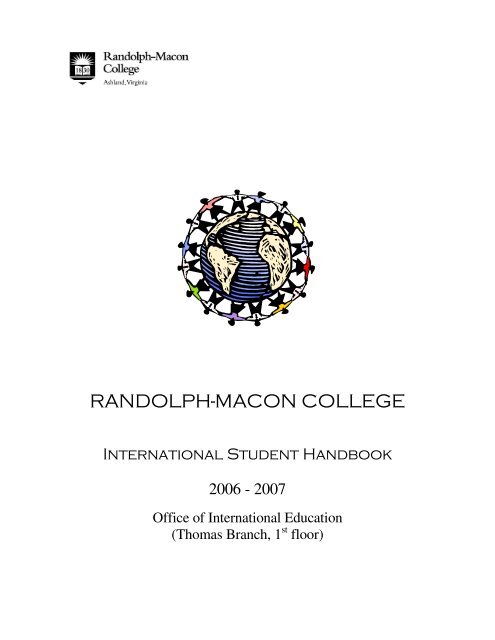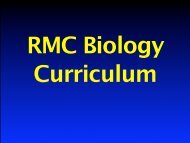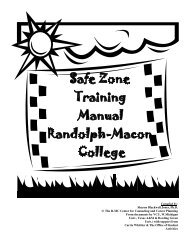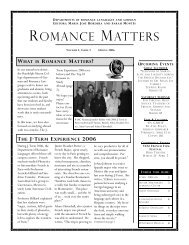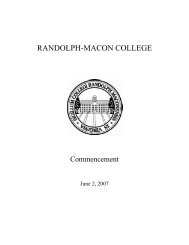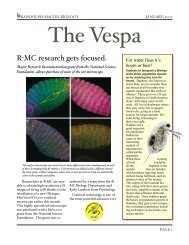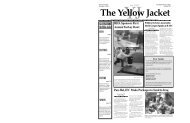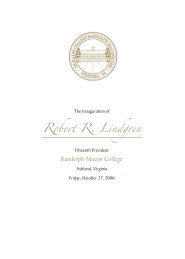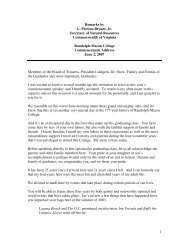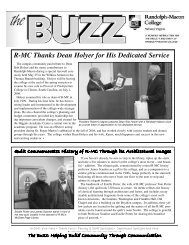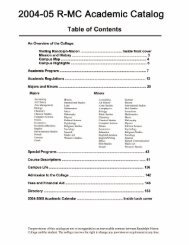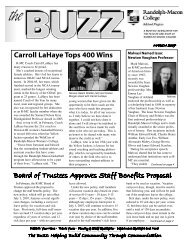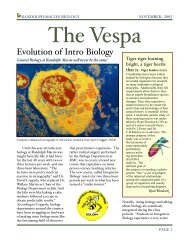RANDOLPH-MACON COLLEGE
RANDOLPH-MACON COLLEGE
RANDOLPH-MACON COLLEGE
- No tags were found...
Create successful ePaper yourself
Turn your PDF publications into a flip-book with our unique Google optimized e-Paper software.
<strong>RANDOLPH</strong>-<strong>MACON</strong> <strong>COLLEGE</strong>International Student Handbook2006 - 2007Office of International Education(Thomas Branch, 1 st floor)
Greetings from Randolph-Macon College and the Office of InternationalEducation!We look forward to your arrival on campus. Whether you plan to study at thecollege for one semester or for several years, we hope your time here will beeducational, enjoyable, and memorable.This handbook contains information that should help orient you to student life atRandolph-Macon and adjust to living in the United States. The handbook is not asource of legal advice and should not be used or understood as such. Informationin the Handbook is subject to change without notice. For the latest informationconcerning immigration regulations, contact our office.While you are at the college, you will have the opportunity to take advantage ofthe many services provided to international students by the Office of InternationalEducation. Feel free to stop by our office anytime. If you have a question aboutthe college and life in the United States, or if you just want to talk, our door isalways open to you!Sincerely,Aouicha Hilliard, Professor of French and Director of International EducationKimberly Cressy, Assistant Director of International EducationMayumi Nakamura, International Programs Coordinator (Intern)Contact InformationMailing Address:Office of International EducationRandolph-Macon College114 College AvenueAshland, Virginia 23005USAPhone: (804) 752-7383E-mail: studyabroad@rmc.eduWebsite: www.rmc.edu/studyabroad
TABLE OF CONTENTSOFFICE OF INTERNATIONAL NAL EDUCATION...............................................................................................1PROGRAMS ..............................................................................................................................................................1ORIENTATION FOR NEW INTERNATIONAL STUDENTS......................................................................................2IMMIGRATION REGULATIONSONS.........................................................................................................................2RESPONSIBILITIES OF INTERNATIONAL STUDENTS ON F-1 VISAS.................................................................3EMPLOYMENT..........................................................................................................................................................4ARRIVAL INFORMATION ....................................................................................................................................5ARRIVAL DATE.........................................................................................................................................................5ENTERING THE US..................................................................................................................................................5TRANSPORTATION..................................................................................................................................................5WHAT TO BRING FROM HOME..............................................................................................................................5CAMPUS LIFE..........................................................................................................................................................6CODE OF ACADEMIC INTEGRITY...........................................................................................................................6ACADEMIC ADVISING .............................................................................................................................................6HOUSING..................................................................................................................................................................7LAUNDRY FACILITIES .............................................................................................................................................7FOOD SERVICE .......................................................................................................................................................8STUDENT I.D. CARD...............................................................................................................................................8HEALTH AND INSURANCE......................................................................................................................................8IMMUNIZATIONS.......................................................................................................................................................8STUDENT HEALTH CENTER ..................................................................................................................................8OTHER <strong>COLLEGE</strong> SERVICESES ........................................................................................................................10COUNSELING AND CAREER PLANNING CENTER ............................................................................................10ACADEMIC SUPPORT SERVICES ........................................................................................................................10THE LANGUAGE LAB ............................................................................................................................................10MCGRAW-PAGE LIBRARY ....................................................................................................................................10COMPUTER SERVICES .........................................................................................................................................11STUDENT ACTIVITIES ...........................................................................................................................................11RELIGIOUS AND VOLUNTEER ACTIVITIES..........................................................................................................11CAMPUS SAFETY OFFICE....................................................................................................................................11OTHER IMPORTANT INFORMATION..........................................................................................................12CULTURAL DIFFERENCES AND ADJUSTMENT..................................................................................................12RICHMOND AREA CLIMATE.................................................................................................................................12PUBLIC TRANSPORTATION..................................................................................................................................13MONEY MATTERS AND BANKING .......................................................................................................................13DRIVER’S LICENSE AND AUTOMOBILES............................................................................................................14TELEPHONE SERVICE ..........................................................................................................................................14TELEGRAMS...........................................................................................................................................................14MAIL SERVICE/SHIPPING ...................................................................................................................................14
OFFICE OF INTERNATIONAL EDUCATIONOur StaffThe Office of International Education, located on the first floor of Thomas Branch, serves as thefocal point for support and information for international students at R-MC. The office isdesigned to support international students as they adapt to their life in the United States and onthe campus of Randolph-Macon College (R-MC).Aouicha Hilliard is the Director of International Education. She is also a Professor of Frenchlanguage and literature, and of International Studies. A native of Algeria, she studied in both hernative country and in the U.S. Professor Hilliard is the Academic Advisor for new internationalstudents. She can be reached both in Haley Hall and in Thomas Branch.Kimberly Cressy is the Assistant Director of International Education. She provides cross-culturaland immigration advising to the college’s international students. Additionally, Kimberly advisesstudents on one-semester, year and January-term study abroad programs and also organizes thepre-departure and re-entry trainings. She is a graduate of the School for International Training,with an MA in International Education and Exchange Management. Kimberly has led youthgroups to Ecuador and Chile and has studied and worked in Austria, Germany, Bolivia, andMexico. Her office is on the first floor of Thomas Branch.Mayumi Nakamura works as the new International Programs Coordinator of InternationalEducation. She is from Japan and received a bachelor’s degree from a university in Japan in2002. She came to the United States to do her Master’s program in International Education, alsoat the School for International Training, and graduated in May 2006. She is dedicated toproviding attentive services and a supportive environment to international students studying inUS higher education institutions using her own experiences as an international student.The Office of International Education maintains office hours from 8:30 a.m.-5:00 p.m. during theacademic year, and 8:30 a.m.-4:00 p.m. during the summer months (June-August). The officetelephone numbers are 001-804-752-3607 and 001-804-752-7383. You may also e-mail Kim Cressyat kcressy@rmc.edu.ProgramsOne of the goals of R-MC is to “enrich our educational program by building diverse internationalperspectives into it.” One means of accomplishing this goal is to sponsor speakers, films,discussions, and other activities, which present different socio-cultural viewpoints. Informationabout programs is found in the weekly calendar of events published by the Office of StudentActivities, on bulletin boards in the Campus Center and in academic buildings, the “Top-Ten List ofThings to Do” distributed by e-mail, and in the student newspaper, The Yellow Jacket.During the orientation and academic year, the Office of International Education will schedule awide range of activities for international students, including shopping trips, visits to historical sites,and outings to a variety of restaurants or attractions in Richmond. We encourage internationalstudents to participate in these outings because they provide students an informal venue in which toget acquainted with other international and American students and to get familiarize with diverse1
cultures in a non-academic environment. It is also a great way to introduce your own culture to yourfriends and the college community!International Interest Group (IIG)Website: http://orgs.rmc.edu/iig/The IIG is an organization of people who have interests in international cultures. Members of theIIG will work closely with the Office of International Education to plan and implement culturalevents and workshops. You will have a plenty of opportunities to learn about the group and howto join them during both international and general new student orientation weeks. If you havespecific questions, contact Tran Le (Junior), the President of the group at tle@rmc.edu.Orientation for New International StudentsIn addition to the regular orientation program for all new students, the staff members from theOffice of International Education conduct an orientation session for international students to helpfamiliarize them with college services and American life and culture. This year’s orientation isscheduled from Monday evening, August 28 th to Wednesday afternoon, August 30 th . We willalso discuss important information such as course loads and how to maintain your visa status. Theinternational student orientation addresses questions you may have about the Ashland andRichmond communities. You will be offered an opportunity to tour the area to get some sense ofwhere things are that you will hear about.Mandatory new student orientation will take place from the evening of Wednesday, August30 th till Friday, September 1 st .A number of faculty and administrative staff are also available to assist international students intheir transition to life in America. Feel free to stop by the Office of International Education and wewill be happy to direct you to the appropriate person.Please e-mail Kim Cressy at kcressy@rmc.edu for more information about the orientation schedule.IMMIGRATION REGULATIONSOffice of International Education and International Student AdvisingThere are many U.S. Citizenship and Immigration Services (USCIS) regulations that apply tointernational students. Each college or university in the US that admits international students willhave one or more designated school officials (DSO’s). Kim Cressy serves as the primarydesignated school official (PDSO) at Randolph-Macon College and she will gladly discuss theseimmigration regulations with you to explain and clarify them. It is essential that internationalstudents understand fully the rights, responsibilities, and limitations that come with their F-1 visastatus. Immigration regulations are highly complex and technical. They also change frequently. TheDSO is here to help you maintain your immigration status, however, it is your responsibility toreport to and consult with the DSO about questions and issues concerning immigration. The DSOkeeps abreast of the latest immigration issues and is responsible for all immigration concerns. If youseek advice from other sources on campus and you are misinformed about a matter, the DSO maybe unable to fix the problem. Please stay in contact with the Office of International Education,2
8. Students must have current and valid documents before making any trip outside the U.S. F-1students need the following documents for re-entry into the U.S.:(a) valid passport(b) Form I-94, arrival/departure record, stapled to the passport(c) valid visa(d) student copy of original form I-20 A-B/I-20 Student ID copy. The DSO at Randolph-Macon must be informed if the student will be departing the U.S., since the student’sI-20 form will require an authorization signature. If the student has lost his or her I-20a new one must be completed.9. Do not engage in unauthorized employment10. Obey all State and Federal laws including laws regulating domestic disputes, childendangerment, driving while under the influence of alcohol or illegal substance, etc.PLEASE NOTE: If an F-1 student’s visa has expired or the number of authorized entries has beenused, he/she will have to go to the U.S. embassy or consulate in their home country to apply for anew visa. If a student is traveling to a third country, the student should be forewarned that he/shemay not be able to acquire another visa and may be denied re-entry into the United States. If it is notpossible to return to your home country, then the student will need a letter from the DSO explainingthe extenuating circumstances. This letter will not guarantee the issuance of a visa. When applyingfor a new visa the student must present a properly executed and endorsed page 4 of the student copyof the I-20 form unless the student has lost his/her I-20 or has had a substantive change on the I-20.EmploymentF-1 students must meet with the DSO before accepting employment on or off campus. Off-campusemployment is very difficult to secure and an Employment Authorization Document (EAD) must beobtained before you are allowed to work off-campus. These documents are hard to obtain, and theU.S. government only grants permission to work under extenuating circumstances. Working offcampuswithout an Employment Authorization Document immediately jeopardizes your status inthe United States. Working without an EAD is a deportable offense.On-Campus Employment – International students are eligible for part-time employment oncampus not exceeding 20 hours per week, while school is in session. To receive permission to workon-campus, the student must consult the DSO. Students who are in the United States on an F-1student visa do not qualify for federally funded “work study” positions. However, internationalstudents may apply for “student-assistant” jobs on campus. The Financial Aid Office will haveinformation about “student-assistant” positions. Whenever an F-1 student is hired on campus, aSocial Security Number has to be obtained (see below), and an I-9 form must be completed andsubmitted to the business office before the student begins working. USCIS regulations regardingpermission to work are strict and complex. Therefore, you should consult the DSO in order to makesure that the proper procedures are followed.Social Security Number4
The Office of International Education staff can take you to the local office of Social SecurityAdministration. We will provide more details during the international student orientation. For yourinformation, the office is located at SOCIAL SECURITY SUITE B 4212 PARK PLACE COURTGLEN ALLEN, VA 23060. Their phone numbers are (804) 934-4570 and 1-800-772-1213.Arrival InformationArrival DateYou are expected to arrive on campus on Monday, August 28 th . If you are planning to arrive beforethis date, you will need to arrange your own housing and travel accommodations.Entering the USPlease sure to carry the following documents with you – NOT in your checked baggage: yourpassport with the US visa stamp, your certificate of Eligibility (SEVIS Form I-20), and thesupporting documentation you provided to obtain the visa when you travel to the US. You will begiven a Form 1-94 (a small white card) on the airplane or at the port of entry to document yourarrival date, port of entry, visa status, and the duration of your stay. You will give this form to theimmigration office at the port of entry, with your passport and Certificate of Eligibility (SEVISForm I-20), and SEVIS receipt. Keep your I-94 stapled in your passport.Transportation from the Airport to CampusThe Richmond area is served by several major airlines at the Richmond International Airportincluding American, Delta, Northwest, United, Continental and USAir. Telephone numbers for eachare listed in the telephone directory or in the yellow pages.The Office of International Education can arrange to pick you up at the Richmond InternationalAirport. If you have not already done so, please send us your itinerary. We must receive this byAugust 21 st . We cannot guarantee transportation for itineraries sent to us after this date. Please lookfor a Randolph-Macon College sign in the baggage claim area.You will need to make your own travel arrangements if you plan to fly into theWashington, DC area. Here is a helpful website that provides train and bus information:http://www.commuterpage.com/metroconnect.htmWhen you arrive at R-MC – on the day of your arrival, the first place you have to visit isthe International House, located at 203 College Avenue. Please look for the registration tableoutside.What to Bring from HomeClothing – Some of you are used to the hot and humid or cold weather and some of you are not.Because of the seasonal variation in the climate here, it is always wise to bring medium-weight coatfor cold weather, as well as rain gear that you feel comfortable wearing. You can also buy moreclothing when you arrive in the US if necessary. Please go to page 12 of this handbook to learnmore about the climate in the Richmond area.5
Special Items – It is highly recommended to bring special items from home such as photographs,musical instruments, traditional clothing, music tapes/CDs, crafts, and recipes. The Office ofInternational Education and Student Affairs will organize events to provide you withopportunities for you to share your home culture such as international festivals, internationaldinners, and cultural exhibits.Glasses, Contact Lenses, Medication – You may wish to bring an extra pair in case they are lostor broken. If you take any special medication, please bring an extra supply, as well as theprescription.Electrical Appliances – It may be good to bring your personal camera and computer if youalready have one at home. Voltage in the US is 110 V, which is different than many othercountries, so some other electrical items are suggested to be purchased here in the US.There are computing facilities on campus available to R-MC students, but they often bring theirpersonal computers from home. Please be aware that the College will not provide support forcomputers that are four years old or older. New network protection software will deny access tothe Internet until student owned computers are registered and appropriate antivirus software isinstalled. Required operating system patches must also be up to date or you will be directed todownload the appropriate patches from our web page during initial attempts to sign on to ournetwork. To learn more, go to “Computer Services” (page 11) in this handbook or visit to ITS’shomepage: http://www.rmc.edu/directory/offices/its/campustech.asp*If you are an exchange student, sheets, blankets and a pillow will be provided by theOffice of International Education.Useful R-MC Library Link: http://www.rmc.edu/directory/offices/library/reference.htmCampus LIFECode of Academic IntegrityThe Code of Academic Integrity is a fundamental component of the educational life at Randolph-Macon College. In order for the educational community to thrive and accomplish its goals, all of itsmembers must honor the principles of academic integrity embodied in the Code. Every student mustsign a pledge to uphold the principles lifted up by the Code of Academic Integrity, which is found inthe student handbook, FishTales, which you can find by going tohttp://www.rmc.edu/currentstudents/handbook.pdf or will receive during your orientation.Academic AdvisingEvery student is assigned to a faculty member who is designated as her/his academic advisor. Theadvisor’s role is to provide counsel and assistance on general academic questions, the selection ofcourses, and the completion of degree requirements. Academic advisors are also available forgeneral advice and assistance on other matters of concern to the student as well as for solvingproblems. The advisor may also serve as a resource for career goals. The relationship between astudent and his/her advisor is a valuable and important aspect of every student’s academic life.6
Normally, a student remains with the academic advisor until she/he has made a decision about anacademic major, normally during the sophomore year. When that decision has been made, thestudent then selects as an advisor a faculty member in the department of the major. A change ofadvisor form is available in the Registrar’s Office for this purpose.HousingRandolph-Macon is a residential college, which means that all students are expected to live inresidence halls (or fraternity or sorority houses or other College-owned housing). Seniors may liveoff-campus with the permission of the Director of Residence Life. The Office of Residence Lifeassigns new students to rooms. After the first year, students select their own rooms, by year inschool (rising seniors first, then juniors, and last sophomores) according to a preferential order,which is established by a lottery.During the past few years, we have added the International House to our campus. The InternationalHouse is intended to house both international and American students together, to foster greaterunderstanding and to facilitate cross-cultural exchange. Not all of the international students chooseto live in the International House, but it does provide a place for international students to gather andsocialize with students who are going through a similar experience. Also, the International House isthe only housing on campus that stays open during the breaks. Since Estes Dining Hall is closedduring the school breaks, the kitchen facilities allow you to prepare your own meals. If you areinterested in this living option, feel free to contact the Office of Residence Life to see if space isavailable.A professional staff member from the Office of Residence Life is on call at anytime day or night. Ifyou have an emergency (something that cannot wait until the next day), contact Campus Safety atextension 4710 or just dial 0.College residence halls are closed during official vacation periods in the College calendar. Thebreaks for the academic calendar 2006-2007 are as follows:Fall Break, October 14-18, 2006Thanksgiving, November 23- 26, 2006Christmas, December 17, 2006 - January 1, 2007January Term Recess, January 28 - February 4, 2007Spring Recess, March 25 – April 1, 2007NOTE: If you need to remain on campus during school holidays, please make arrangements withthe Office of Residence Life, located in Mary Branch Hall. The phone number is 752-4722.Laundry FacilitiesWashing machines and dryers are available at a central location on campus. To use the machinesyou need to deposited adequate amount of money on your I.D. card at the Business Office or usequarters ($1 each for washing and drying). The machines require quarters to operate. Duringorientation we will help you locate the facilities.7
Food ServiceStudents who live on campus are required to purchase a meal plan that allows them to take theirmeals in Estes Dining Hall. Its hours of operation are listed in the student handbook, Fish Tales. Ifyou are on a meal plan, you can also use your student I.D. card (see below) to obtain breakfast,lunch, or dinner in the snack bar, called Macon Coffee, which is located in the Brown CampusCenter. In addition, students can pick up a light carry-out meal, after 4:00 p.m., at SouthsideExpress, located on the east side of Estes Dining Hall, (open from 4 p.m. to 1 a.m., Mondaythrough Friday, and from 1 p.m. to 2 a.m. on Saturday and Sunday). Meals and snacks may alsobe purchased, on a cash basis, in Macon Coffee.While classes are in session, Estes Dining Hall, Macon Coffee, and Southside Express are openseven days a week. The food service is closed during official College recess periods, but there are anumber of places to eat within walking distance of the campus.Student I.D. CardEvery R-MC student must have an identification (I.D.) card. The cards may be obtained at CampusSafety by having your picture taken. There is no charge for the first card, but if you lose your card,there is a replacement charge of $10.The student I.D. card serves a variety of functions. The I.D. card (also known as the “universalcard”) provides access to a variety of buildings on campus. If you deposit money in an account inthe Business Office, your I.D. card can be used in lieu of cash in soda machines and the laundryroom. It also is required in the dining hall, the Brock Center, and for admission to college programsand athletic events.Health and InsuranceImmunizationsAll students are required by Randolph-Macon College to have a complete physical and be up-todateon their immunizations prior to arrival. Students must have written records of theimmunizations translated into English that they have received from their health care provider.The required immunizations are DPT/Polio (diphtheria, pertussis, and tetanus), MMR (measles,mumps, and rubella), and a recent PPD skin test for tuberculosis.If for some reason you have not received your immunizations, or have no written records, youwill be required to get the required shots at your own expense, after you arrive on campus. Pleasewatch your mail for forms that will be sent to you from the Dean of Student’s office regardinghealth issues and requirements.Student Health CenterRandolph-Macon College employs a nurse practitioner to take care of basic medical needs such asimmunizations, allergy shots, and diagnostic testing. The nurse practitioner works in conjunctionwith a physician. The Student Health Center is located in the Brock Center and operates Mondaythrough Friday, 10 a.m. to 4 p.m. Students are seen there on a first come, first served basis. TheStudent Health Center’s phone number is 804-752-3043.8
How do I get medical attention after 5:00 p.m.?You may call the clinic and have a nurse practitioner or physician paged. If you are not feeling welland it is not an emergency, you may visit a walk-in clinic, such as Patient First. There is a PatientFirst located on East Parham Road, Richmond. They have office hours daily, from 8 a.m.-10 p.m.,and see patients on a first come, first served basis. This facility is not affiliated with the college andpayment is required when services are rendered.If you need to go to a hospital and it is not an emergency, the closest facility is Henrico Doctor’sHospital on East Parham Road in Richmond. The phone number for the hospital is (804) 747-5770.They have an Emergency Room that can tend to your medical needs. This is not a good place to goUNLESS your condition requires IMMIDIATE attention by a doctor. Emergency rooms areoften crowded and expensive and you must pay for services when they are provided.In the case of a true medical emergency on campus, call Campus Safety by dialing 0 from acampus telephone. They will aid you in the case of an extreme emergency. Throughout the U.S.,you can also dial 911 to contact emergency services administered by the local government. Theywill dispatch the appropriate medical, law enforcement, or fire safety personnel. Call 911 only ifyou have an emergency. From a campus telephone you must dial 9-911.Do I need health insurance?Yes, because in the United States each individual is responsible for paying the costs of her/his ownmedical care. There is no governmental assistance (except for certain low-income U. S. citizens andpermanent residents, and this assistance is minimal). As an international student, you will not becovered by governmental assistance.The cost of health care in the United States is quite high, and the majority of Americans cannotafford medical care without the assistance of health insurance. As an international student, a seriousillness or injury requiring hospitalization could mean financial ruin for you and your family and theend of your education in the United States. It is imperative that you have some medical insurancethat will cover you while you are in the U.S.If you do not have an adequate health insurance policy upon arriving at Randolph-Macon College,you MUST enroll in one. Although we do not promote any particular company, we can provideyou with information. Here is a list of companies from which our past international students havepurchased their insurance policies for your information. We encourage you to compare a fewdifferent plans before you purchase.• HTH Worldwide (http://www.hthstudents.com/), which can provide a basic policy from$35.00 per month (http://www.hthstudents.com/enroll/gs_pricing.cfm).• GatewayUSA (http://www.gatewayplans.com/gw_usa.cfm), which can provide a basicpolicy from $49 per month.The Office of International Education staff will assist the students that need to sign up for insuranceonce they arrive on campus. You are required to maintain an insurance policy while you areenrolled at Randolph-Macon College and will need to provide proof of enrollment to the Office ofInternational Education on a regular basis.9
If you currently have a policy that will cover you in the United States, you must submit a copy ofthat policy in English to the nurse practitioner so we can determine if the policy is adequate whilestudying at Randolph-Macon College.OTHER <strong>COLLEGE</strong> SERVICESCounseling and Career Planning CenterThis office offers assistance to all students with any personal, educational, or career concerns theymay have. The staff is available not only for helping students deal with problems but also to assistthem in developing new personal skills and a better self-understanding. If you are having troubleadjusting to your new situation in the United States, feel free to set up an appointment with acounselor. They can often point you in the right direction to improve your experience at Randolph-Macon College.As noted above, students may also come to this office if they need career advice and guidance.Counselors will help you prepare a resume to seek employment, can offer you tips on interviewing,and can guide you in your selection of appropriate clothing to wear to an interview.For additional information, you may telephone them at 752-7270 or visit the Center, which islocated on the first floor of Thomas Branch.Academic Support ServicesThe College provides a variety of academic support services to students through the HigginsAcademic Center (HAC), which is located on the first floor of Thomas Branch. Through programsoffered by the HAC, students can obtain assistance with reading and study skills as well as tutoringhelp with any class they are taking. This office also can provide mentors for international studentsthat are trained to help you adapt to life at Randolph-Macon College. Dr. Jennifer Bruce is thecontact person for these services. She can be reached at 752-3201.The Language LabThe Language Lab, located in Haley Hall, is designed to support language learning and teaching.The lab has twenty-three computers that have the capabilities to send and receive texts in avariety of languages. If you need to complete a paper in a language other than English, thelanguage lab computers will have the tools you need. The faculty and staff are always willing towork with incoming international students.McGraw-Page LibraryThe library hours for the regular academic year are 8:00 a.m. until 1:00 a.m., Monday throughThursday, 8:00 a.m. until 8:00 p.m. on Friday, 11:00 a.m. until 6:00 p.m. on Saturday, and 12:00noon until 1:00 a.m. on Sunday. Hours for other times will be posted on the front door.Spanish, French, and German language newspapers are available as well as an English-languageedition of The Japan Times. Magazines or journals are available in Spanish, French, and German.You should ask at the circulation desk of the library for these publications. Reference librarians are10
available at the library’s Information Desk to assist you in locating information and in general to aidyou in using the resources of the library.Photocopy machines are available in the library, which also has microfilm and microfichereaders and reader-printers. A student I.D. card is necessary to check out materials from theMcGraw-Page Library.Computer ServicesPersonal computers for student use are available in Copley Science Center room 201 and in theMcGraw-Page Library. If you have special requirements, feel free to contact InformationTechnology Services (ITS) at extension 8500. They will be happy to work with you to meet yourcomputing needs.If you are bringing a computer or laptop to campus, ITS will help you set up your computer in yourroom. The set up will occur during your orientation period, and you will be assigned an e-mailaccount. If you have any further needs, or just need help familiarizing yourself with the computersystem, feel free to contact ITS.Student ActivitiesRandolph-Macon College has over 100 groups and clubs that are active on campus. The groupscover a variety of interests, and many students find themselves involved in one or more activities.There are clubs involved in athletics, outdoor activities, service projects, social groups, and specialinterest activities. There are also a variety of groups that may be of particular interest to aninternational student such as the International Interest Group, the Multicultural Association, and avariety of language clubs.The Student Activities office, which is responsible for coordinating these groups and activities, islocated in the Campus Center. Sarah Hamby, office manager, keeps a calendar of all studentprograms and activities. You should stop by the office to learn more about the various groups andprograms available on campus or give them a call at 752-7318.Religious and Volunteer ActivitiesThe Chaplain of the College, Darrell Headrick, is responsible for coordinating programs andactivities in the area of religious and social concerns. R-MC students are involved in manyvolunteer social service activities through his office. In addition, he serves as advisor to a number ofstudent groups, among them a chapter of Amnesty International, a group that devotes time to issuesof world peace and justice. The Chaplain’s office is on the second floor of the Campus Center.Campus Safety OfficeR-MC Campus Safety officers patrol the campus regularly. They are always available as a source ofassistance to you in an emergency and they can frequently help with routine questions or problems.They are concerned about law enforcement on campus, the enforcement of College regulations,emergency medical assistance, parking, public safety, fire prevention, and related matters. TheCampus Safety office is located at 203 Caroline Street and the phone number is 752-4710. It is openfor 24 hours, 7 days a week unless otherwise specified. Feel free to contact the office if you needany assistance.11
OTHER IMPORTANT INFORMATIONCultural Differences and adjustmentStudying in a foreign country can be an exciting and rewording experience. It can also bechallenging or difficult at times. In addition to the language differences, you may soon find yourselfperplexed by the cultural differences you will encounter both in student life at Randolph-Macon andin the broader community. Why do Americans behave the way they do? How do communicationstyles, ways of reasoning, and differences in customs vary from your culture? It is extremelyimportant for you to keep in mind that all international students go through a period ofadjustment and to be well prepared for a new and challenging intercultural experience. Thewillingness to experiment, curiosity, sense of humor, open mind, and patience will certainly behelpful in making your time at Randolph-Macon College and in the US rich and meaningful.Useful Resources:• http://www.educationusa.state.gov./This website contains useful information about the US higher education system, pre-departureplanning, living and studying in the US in general, and so much more. We highly recommend foryou to explore the site!• “American Ways” by Gary AlthenThis is one of the most concise introductions to understanding American culture. The book presentsgeneral ideas about American life and culture, discusses more specific aspects of American life, andprovides tips on coping with cultural difference. The Office of International Education offers avariety of resources that you can borrow, which is located on the hallway of the Office ofInternational Education in Thomas Branch.• CIA World Fact Book http://www.odci.gov/cia/publications/factbook/index.htmlRichmond Area ClimateThe Richmond area has four definite seasons of the year. The summer months (June, July, August)are typically quite warm and humid. The fall months (September, October, November) are mild,although September can produce some hot days. The first frost of the year usually occurs in mid- tolate October. The winter months (December, January, February) are fairly cold and frequently rainyand disagreeable. Winter is unpredictable; some years we get very little snow while in other yearswe get lots of snow. Springtime (March, April, May) brings mild temperatures. It can also be rainy,but not unpleasantly so.Temperature ranges in both Fahrenheit and Celsius, high and low, by months are as follows:January - 47° and 27° (F), 8° and -2° (C)February - 49° and 28° (F), 9° and -2° (C)March - 58° and 35° (F), 14° and 1° (C)April - 70° and 45° (F), 21° and 7° (C)May - 78° and 54° (F), 25° and 12° (C)July - 88° and 67° (F), 31° and 19° (C)August - 86° and 65° (F), 30° and 18° (C)September - 80° and 59° (F), 26° and 14° (C)October - 71° and 47° (F), 21° and 8° (C)November - 60° and 37° (F), 15° and 2° (C)12
June - 85° and 62° (F), 29° and 16° (C)December - 49° and 28° (F), 9° and -2° (C)This area typically has 85 days when the lowest outside temperature is at or below freezing (32°F)and 41 days when the temperature exceeds 90°F. Average snowfall each year is 14 inches, and theaverage rainfall is 43 inches. On an average there will be 113 days per year when there is some formof precipitation.Public TransportationThe only public ground transportation to Richmond International Airport (RIC) is by taxi orGroome Transportation. The cost is approximately $35.00 (one way for one person). To contactGroome Transportation to schedule a pickup, call 222-7222, at least one day before you needtransportation.Passenger railroad (train) service in provided throughout the United States by Amtrak. Amtrakservice is available from Ashland to Washington, D. C. and other destinations every day of theweek. The train station in Ashland is adjacent to campus; however, train service in the U.S. is lessfrequent, less convenient, and more expensive than it is in many other countries. To obtain aschedule and inquire about pricing, check the Amtrak website, www.amtrak.com, or call 1-800-USA-RAIL.Money Matters and BankingMost Americans do not carry large amounts of cash with them. They pay for purchases by writingchecks or by using credit card. They also pay monthly bills and living expenses by check or on-line.International students at Randolph-Macon College are encouraged to open a checking account at alocal bank. There are several within walking distance of R-MC.Two Basic Types of Bank Accounts:1) A CHECKING ACCOUNT is the most convenient and practical way to handle one’s finances.It is designed for frequent use, and there is often a small monthly charge for writing checks. Youcan often get a debit card with your checking account that will simplify your transactions. Thereare several automatic teller machines (ATMs) in the Ashland area. Options and costs differ frombank to bank, so you should shop around for the plan that best meets your needs.2) A SAVINGS ACCOUNT may be desirable if you have brought with you a large sum of moneyand wish to earn interest on it. Withdrawals from savings accounts can be made, but frequentlythere are some limitations.Money TransferMost banks can accomplish overseas transfer of money; however, some banks are more efficient atthis than others. Most will limit this service to customers who have a bank account with them. Youshould ask the bank about the best way to transfer money from overseas and what their proceduresare. Find out what their correspondent bank is in the country from which the money is being sent.Ask the sender of the funds to send the money through the correspondent bank because this willsave time. When sending funds, ask the sender to be specific about the name, address, and telephonenumber of the receiver, the name of the bank in Ashland to which the money is being sent, and theaccount number of the receiver.13
When setting up either a savings or checking account, you will need to have your student I.D. cardand your passport. You will have an opportunity to visit a bank of your preference in the area duringthe international orientation.Driver’s License and AutomobilesA valid driver’s license is required in order to drive a motor vehicle on public roads in the UnitedStates. Driver’s licenses are issued by each state, not by the federal government. Students may applyfor a Virginia driver’s license at any Department of Motor Vehicles (DMV) office. The DMV officeclosest to Randolph-Macon College is located at the intersection of U. S. Highway 1 and ParhamRoad, about 8 miles south of campus. The telephone number is 804-367-0538.To apply for a Virginia driver’s license you must bring your passport and pass written, vision, androad (behind the wheel) tests. All information for the written test is contained in the Virginia“Driver’s Manual” available at any DMV office. In addition, you will need your social securitynumber. If you are ineligible for a social security number, you must obtain a letter from theInternational Student Advisor explaining why you have not been issued a social security number.The length of time for which a driver’s license is valid can vary according to the age of the driver.The requirements for a driver’s license change regularly. Please see the staff of InternationalEducation if you are interested in getting a license so we can investigate the current regulations.Telephone ServiceThe college provides local telephone service. However, students must provide their own telephones,which can be purchased at many area stores. During orientation, the resident assistants, or “RAs,”will contact the college’s physical plant office and help you set up your voice-mailbox. The collegehas contracts with several long-distance carriers. You can choose your long-distance telephoneprovider, but you will be responsible for paying for all long distance calls.For international students, it might be wise to invest in an international calling card that offerscompetitive rates. The calling cards are available at various locations in a variety of monetaryincrements.Mobile PhonesThey are often called “cell(ular) phones” in the US. There are major companies’ branches located inthe Ashland and Richmond area, such as Verizon, T-Mobile, Sprint, and Cingular. Depending onwhether or not you have a social security number or a credit history in the US, you have differentoptions and different fees to pay. Please ask the Office of International Education staff anyquestions. We will be happy to give you advice or explain the terms which you might not befamiliar with.TelegramsTelegrams can be sent through Western Union. Money transfers may also be made through WesternUnion. For messages, telephone 1-800-325-6000.Mail Service/ShippingThe College mailroom is located in Peele Hall. Service is limited to distribution of all internalmail and all U.S. mail to students, including packages. Every Randolph-Macon student who lives14
on campus is assigned a box in the student mailroom located in the Brown Campus Center. THIS ISA CAMPUS MAILBOX AND NOT A U.S. POSTAL SERVICE BOX. Typically, two to threepeople share a postal box. Commuter students are assigned a postal box in the Brown CampusCenter, but they may also receive information at their home address.An office of the U. S. Postal Service (also called the Post Office) is located one block from thecampus, at the corner of Henry and England Streets, across from the R-MC Welcome Center. Itprovides a variety of services including air and surface mail, parcel post, express (overnight) mail,money orders, registered and certified mail, stamps, and postage information.Other express delivery services are available through private companies such as United ParcelService (UPS) and Federal Express (FedEx). Check with the Student Activities Office for moreinformation.Sending a Package to R-MC/the US – if you or your family want to send a packagefrom your home country, you use the address below. You can do so even before your departure tothe United States. You may have a variety of personal possessions, but remember it might be easierto purchase items such as sheets, towels, and electrical appliances once you are in the United States.During your orientation process, the staff from the Office of International Education will providetransportation to local stores so that you can purchase the necessary items.Your NameBrown Campus CenterRandolph-Macon College304 Henry StreetAshland, VA 23005-5506USAReceiving a Package from Home – Your mail will be delivered to your student mail boxin the Brown Campus Center, which will be given when you arrive on campus. Insured mail,registered mail, and money orders must be obtained at the U.S. Post Office, one block fromthe campus on England Street.Sending a Package from R-MC – Ask the U.S. Post Office in Ashland for informationabout shipping books at a low book rate. Also, they can provide information about sending goodsby surface mail (sent on ships) rather than airmail. Heavy items, such as trunks, etc., may be sentoverseas by ship. See the yellow pages in the telephone directory under “Freight Forwarding” forcompany listings.15


